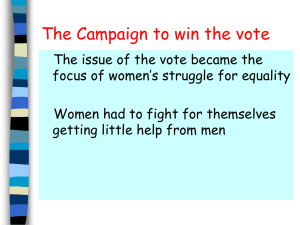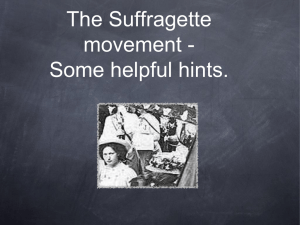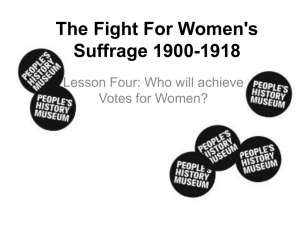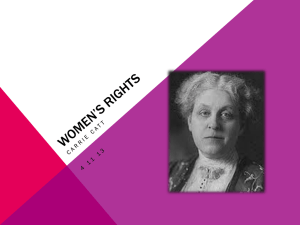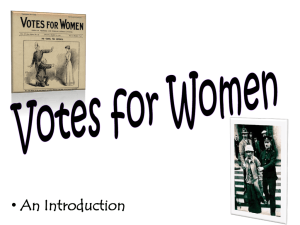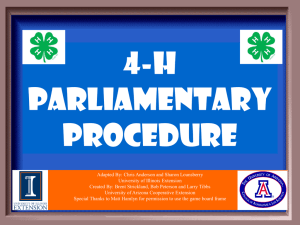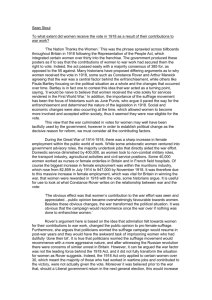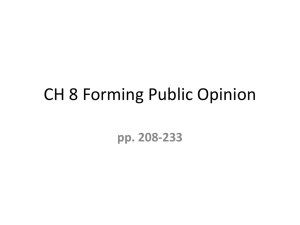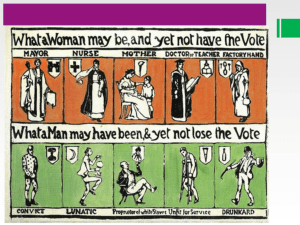New Higher presentation
advertisement
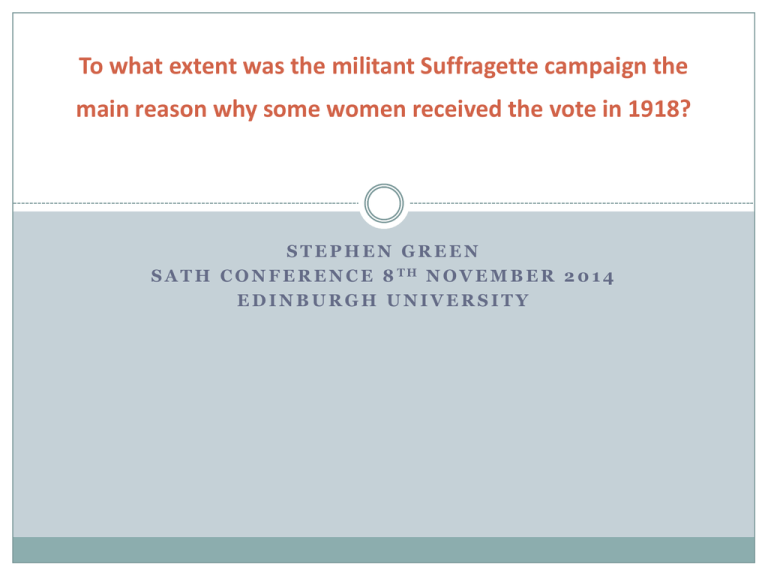
To what extent was the militant Suffragette campaign the main reason why some women received the vote in 1918? STEPHEN GREEN S A T H C O N F E R E N C E 8 TH N O V E M B E R 2 0 1 4 EDINBURGH UNIVERSITY Throughout the 19th century more and more men were given the right to vote yet there was no sign of the right to vote in national elections being given to women. This gave rise to the women’s suffrage movements. Context/Background Therefore it can be argued the militant Suffragette campaign was the main reason why women over 30 gained the vote in 1918. Line of Argument However, there are others factors which have to be considered such as the peaceful Suffragist movement, the contribution made by women in the Great War and changing social attitudes towards women. Other Factors Emmeline Pankhurst established the Suffragettes (WSPU), in 1903 with the motto ‘Deeds Not Words”. The militant group were determined to gain media attention for their campaign, using methods such as chaining themselves to railings outside parliament and even arson attacks on houses that belonged to members of the government. Use of Knowledge This was important because it gained publicity for the WSPU. Despite breaking the law, the newspapers took notice and the Suffragettes had achieved their first objective – publicity. Analysis Even after being arrested Suffragettes would go on hunger strike in prison as a form of protest . Use of Knowledge However, the publicity was not always positive and it made it easier for women to be branded as unfit for the vote and therefore politicians used this argument as an example of why women could not be trusted with the vote before 1918. Analysis + Historical opinion suggests that the Suffragette cause pushed the Liberal Government, at the time, to discuss women's right to vote and without them it would not have been considered. Therefore it is clear the Suffragettes were very important in encouraging the right to vote. Although it should be remembered they did little to change Government opinion. Despite the fact the different suffrage organisations (WSPU/NUWSS) were looking to gain the same end result; votes for women, their differing methods and motives diluted their impact on gaining the vote. Evaluation The main alternative to the Suffragettes was the Suffragists. Founded in the late 1800s the NUWSS had a very different approach to gaining the vote for women. Link The Suffragists believed in moderate, ‘peaceful’ tactics to win the vote such as meetings, pamphlets, petitions and parliamentary bills. Members would distribute leaflets, have meetings with members of government and ask people to sign petitions in order to gain support for the campaign. Use of Knowledge This was important because it led to some members of the government accepting the idea of women's suffrage. Analysis Although support for the Suffragists remained low initially, once the militant Suffragettes emerged many women joined the Suffragists as they strongly apposed the violent methods the Suffragettes used. Analysis + While the Suffragist campaign played an important role in maintaining support and interest in the campaign for Suffrage, it failed to deliver the vote for women before 1914. However, historical debate now suggests the contribution women made during the Great War, rather than any of the pre1914 Suffrage movements, did in fact play a more important part in helping women gain the vote by 1918. Evaluation Britain declared war on Germany on 4 August 1914 and two days later the NUWSS suspended its political campaigning for the vote. Link Women’s war work was important to Britain’s eventual victory as more than 700,000 women were employed making munitions. Use of Knowledge This was important because women became a crucial part in Britain's fight to win the war and led to them gaining respect and even changing the minds of certain government leaders like Asquith, who had previously opposed the vote for women. Analysis The traditional explanation for the granting of the vote to some women in 1918 has been that women's war effort radically changed male ideas about their role in society and that the vote in 1918 was almost a thank you for their efforts. But the women who were given the vote were 30 or over, not the younger women who worked long hours and risked their lives in munitions factories. However, another argument against the Great War is that the government was terrified of the violent Suffragettes starting up their campaign again and decided to give the vote to some women in 1918 to avoid this. The war acted more as a catalyst, but the tide was already flowing towards female suffrage before it started. Evaluation The campaigns for women’s suffrage can be seen within the context of changing attitudes within society towards women in the late 19th and early 20th centuries. Link Even the leader of the Suffragists, Millicent Fawcett felt that changes in society were one of the leading factors in women winning the right to vote. Analysis The late 1800s saw changes like women gaining rights to their children & property, Educational opportunities at University slowly opened up to women and professions such as the law opened up. Women became increasingly active in public affairs – town councils, Boards of Guardians and members of political organisations. Use of Knowledge This was important because this small but important political voice led to many women becoming more involved in politics. Analysis Without this initial political chance it could be argued it might have taken women longer in receiving the vote. Analysis + The historian Martin Pugh stated that “their participation in local government made women’s exclusion from national elections increasingly untenable”. Therefore recognition of their changing role in society was reflected in the very important political steps they had taken. Although it could be argued, if the Suffragette campaign had not demonstrated the actions women were willing to take, to gain the vote, it is possible the enfranchisement of women could have taken a lot longer to achieve. Evaluation On the one hand it is true to say that the Suffragette and Suffragist campaigns were paramount in some women gaining the vote in 1918, because women had pushed the accepted boundaries to gain suffrage. On the other hand the timing of the vote clearly demonstrates the role of the war, as women over 30 were given the vote in the same year the war ended. Balance Finally, and most importantly, the role of women was changing in the 19th century, giving women a better and stronger place within society. Without this they may not have had the confidence to fight and win the vote. Overall judgement Marks: Historical context 2/2 Conclusion 2/2 Use of Knowledge 6/6 Analysis 6/6 Evaluation 4/4
